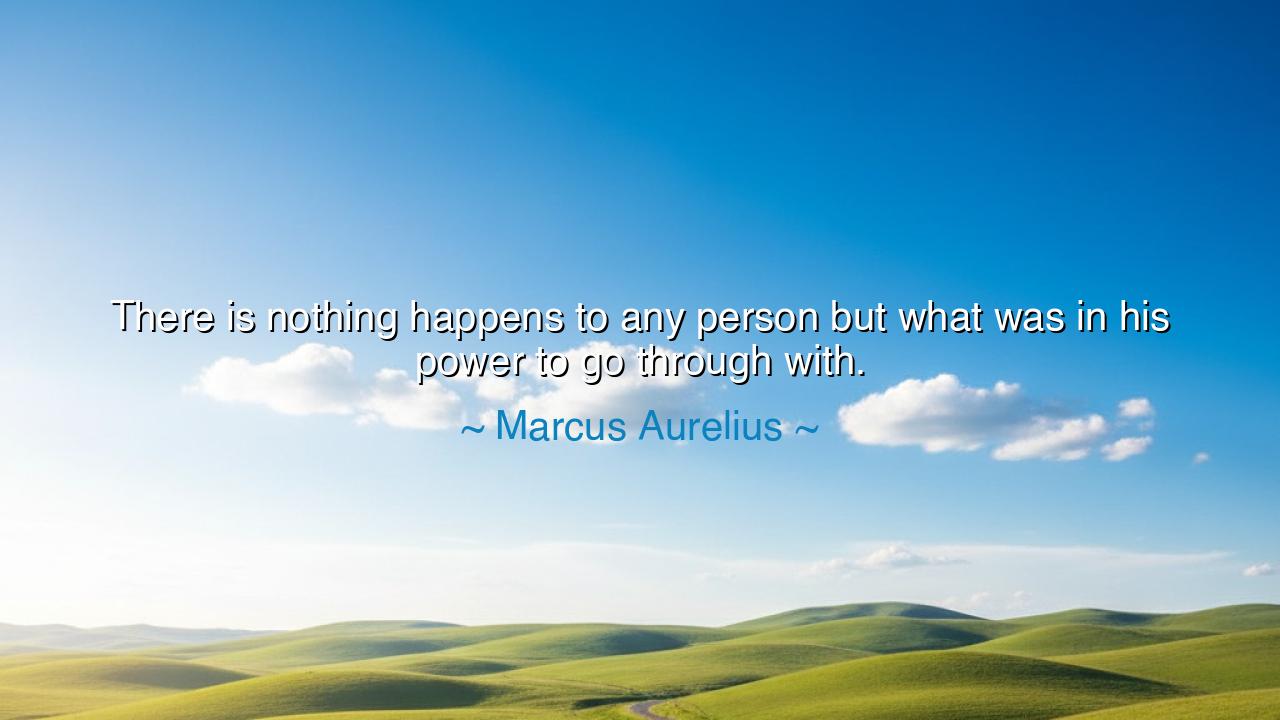
There is nothing happens to any person but what was in his power






In these profound words, Marcus Aurelius, the Stoic emperor of Rome, speaks to the enduring strength and resilience of the human spirit. He declares that nothing happens to any person that lies beyond their capacity to endure. Every trial, sorrow, or challenge is, in essence, within the power of the individual to face. His wisdom teaches that life, though often unpredictable and harsh, is never so overwhelming as to render the soul powerless; within each of us lies the ability to navigate the storms of existence with courage and reason.
The origin of this insight is rooted in Stoic philosophy, which emphasizes the cultivation of inner strength and rational judgment. Stoics believed that while external events may be beyond our control, the mind and spirit remain sovereign. Aurelius wrote these reflections in his Meditations, not as abstractions for students of philosophy, but as personal guidance to remain steadfast in the face of political strife, war, and the burdens of empire. Here, the emperor turns adversity into an instrument of personal growth, teaching that endurance and virtue are inseparable.
History offers vivid examples of this truth in action. Consider Viktor Frankl, the 20th-century psychiatrist and Holocaust survivor. Amid the unimaginable horrors of Nazi concentration camps, Frankl realized that while he could not control his suffering, he could control his response to it. By choosing meaning and purpose in the midst of despair, he exemplified the Stoic principle that every person possesses the power to go through even the most extreme trials. Aurelius’ ancient insight finds resonance in Frankl’s modern courage, demonstrating the timelessness of the Stoic vision.
The quote also emphasizes the importance of perspective. Life presents hardships, yet by understanding that we possess the internal capacity to face them, fear is diminished, and strength emerges. The challenges themselves are not punishments, but opportunities to cultivate virtue, patience, and wisdom. Just as a blacksmith tempers steel in fire, human beings are forged and strengthened through their trials. By accepting this, we learn that endurance is not passive, but an active assertion of the soul’s sovereignty over circumstance.
Ultimately, Marcus Aurelius’ words are a call to self-mastery and courage. They remind future generations that external chaos cannot overwhelm the spirit unless we allow it, and that every challenge contains within it the seeds of resilience. Let this teaching endure: no burden is too great for the soul prepared to bear it, no trial too heavy for the mind trained in reason, and no sorrow too deep for the heart willing to meet it with courage. In this lies the essence of human strength, eternal and unconquerable.






VBvinh bui
This line feels like a call to courage. It reminds me that endurance isn’t about denying pain but walking through it with dignity. It’s inspiring, but I also question how it applies to modern mental health struggles. Not every hardship feels survivable without help. Maybe the wisdom here lies in recognizing that strength doesn’t mean isolation—it can also mean reaching out for support.
GDGold D.dragon
There’s something profoundly stoic in this idea—that we are equipped by nature to face whatever befalls us. It gives life a sense of moral structure, as though the universe never burdens us beyond our limits. Yet it also places a lot of faith in human resilience. I wonder, does this belief require spiritual grounding, or can it stand alone as a psychological truth?
KKhanh
I like how this quote reframes adversity as a test of human capability. It implies that challenges are not punishments but opportunities to realize our potential. But I can’t help questioning whether that mindset works for everyone. Some people face trauma so severe that survival itself feels miraculous. Can Stoic philosophy still offer comfort without invalidating the depth of someone’s pain?
BRblue rock
This statement resonates deeply with me because it’s both comforting and humbling. It implies that we are never truly powerless, even when we feel defeated. Still, I wonder if Marcus Aurelius was being idealistic. There are moments in life that seem unbearable—loss, illness, betrayal. Is it fair to assume everyone can endure everything? Or is it more about discovering unseen strength through suffering?
LNLe Nhu
I find this perspective both empowering and demanding. It suggests that we always have the capacity to handle whatever life gives us, but that can feel heavy—almost like a moral obligation to be strong. Do you think this belief could lead someone to suppress their emotions instead of acknowledging their struggles? It’s a fine balance between courage and denial of vulnerability.